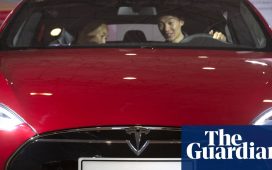Earlier this year, the Society of Motor Manufacturers and Traders (SMMT) announced that the UK electric vehicle (EV) market has progressed from the ‘early adopter’ phase.
Owing to the persevering efforts of the nation’s automotive industry, the trade association revealed that over 800,000 EVs have been registered in the UK, representing an impressive 20-fold increase from 2018 when EVs had a market share of only 0.8%.
According to SMMT’s latest data, the EV market will boast an almost 18% market share by the close of 2023.
Despite the government’s recent decarbonisation delays, pushing back the ban on the sale of internal combustion engine (ICE) vehicles to 2035, members of the automotive industry, such as New AutoMotive, have confirmed that they stand firm in their commitment to transition to electric mobility as soon as possible.
One of the remaining obstacles to continuing the EV market’s current upward trajectory in the UK is the upfront costs of EVs which remains one of the most prominent deterrents for potential drivers.
Earlier this year for example, the Analysis, Statistics and Research Branch (ASRB) of the Department for Infrastructure (Dfl) published its EV attitudes report towards EVs in Northern Ireland. This report revealed that at 70%, the top disincentive for buying an EV was the initial purchase price. An attitude shared throughout the UK.
Securing a second-hand EV market, will widen the accessibility of EVs and therefore be key to the electrification of UK roads.
Where is the UK’s EV market now?
In August this year, the SMMT reported that used EV year-on-year (YOY) sales had soared in Q2 2023 by 81.8%, to 30,645 units and accounting for a record 1.7% of the market share, compared to only 0.7% last year.
Used plug-in hybrid (PHEVs) and hybrid vehicle (HEVs) sales also went up, increasing by 11.4% to 18,437 units and 29.5% to 53,634 units respectively.
“It’s great to see a recharged new car sector supporting demand for used cars and, in particular, helping more people to get behind the wheel of an electric vehicle,” says SMMT’s chief executive, Mike Hawes.
“Meeting the undoubted appetite for pre-owned EVs will depend on sustaining a buoyant new car market and on the provision of accessible, reliable charging infrastructure powered by affordable, green energy. This, in turn, will allow more people to drive zero at a price point suited to them, helping accelerate delivery of our environmental goals.”
A number of promising schemes aimed at making the second-hand EV market more accessible have also begun emerging, such as Octopus EV’s ‘Nearly New’ salary sacrifice scheme launched in July this year.
Similar to the government’s cycle-to-work scheme, Octopus EV’s leasing offer allows drivers to buy a second-hand EV for reduced costs, saving between 30% and 40% per month by paying through their gross salary.
“Ultimately, what we’re here to do is to get as many people into electric cars as possible, that therefore means making electric cars more affordable for people and used cars is the natural segue to do that,” Natalia Peralta Silverstone, head of propositions at Octopus EV tells Current±.
“We’re talking about a second hand car now, but eventually we’ll be talking third and fourth hand, electric cars. For our business, that’s where it gets exciting, as you can really start making it to a mass adoption. That was the inspiration behind [the ‘Nearly New’ scheme], how can we make EVs more affordable for a wider segment of our customers?”
According to Octopus EV, the new scheme will mean drivers can pay an estimated £300 to access a second-hand EV (such as the Renault Zoe or Peugeot e-208) alongside fuel, insurance and maintenance costs.
When asked if she believed the scheme would be as popular as the company’s salary sacrifice scheme for new EVs, Peralta Silverstone reveals that the response to the used car scheme’s testing phase has been “super positive” with both new customers and members of the public sector expressing interest.
“If you were thinking about the used car market, generally there are three or four year old cars coming back into the market now in volume, so I think over the next 12 to 18 months, you’ll see the ‘Nearly New’ proposition grow rapidly” adds Peralta Silverstone.
Navigating the road ahead
Last month (September), the professional services partnership, EY released its latest EV Country Readiness Index, in which the UK ranks fifth out of the world’s top 20 markets.
Although the nation’s rank remains unchanged – largely due to significant demand for new EVs with BEV and PHEV sales expected to rise to 26% this year – worsening challenges around regulation and supply could affect the UK’s progress.
Optimising the second-hand EV market will help mitigate this impact, acting as a catalyst for a nationwide adoption of EVs.
Current± publisher Solar Media is hosting its EV World Congress event in London this 10-11 October, which will feature a ‘Navigating the Second Hand EV Market’ panel. Moderated by Claire Miller, board advisor at Octopus EV, the panel will discuss the challenges faced and opportunities offered by the second-hand EV market.
“The used EV market is critical to the UK’s transition to zero emission road transport. Government’s support for charging infrastructure and stimulating the new EV market through grants and tax measures, has helped the supply of EVs into the used market,” says panellist Abdul Chowdhury, head of vehicle policy for the Office for Zero Emission Vehicles (OZEV).
Fellow panellist, Marc Palmer, head of strategy and insight at Autotrader adds: “Fundamental to decarbonisation over this decade, the used EV market is still in its early phases of maturity. Supply and demand dynamics are volatile, with pricing yet to fully settle.
“Consumers have clear obstacles to overcome in affordability, faith in charging and battery reliability. Overcoming these in the near term is critical in order to stimulate the demand needed to absorb future supply, and underpin a healthy mass-market transition.”
The EV World Congress conference will focus on some of the key discussion points from across the EV sector including delivering coherent EV charging strategies, whether the UK is on course for its 2030 charging target, vehicle-to-grid (V2G) technology and more. More information, including how to attend, can be read here.











